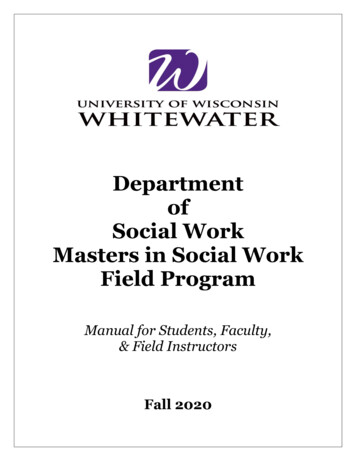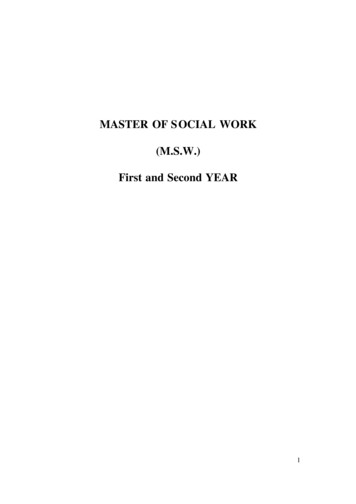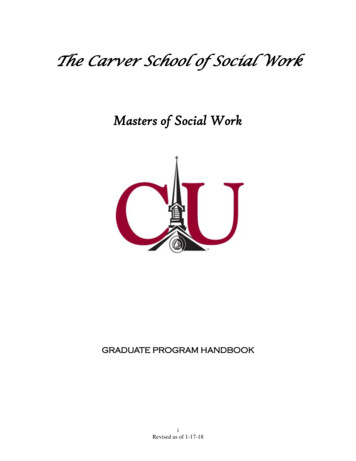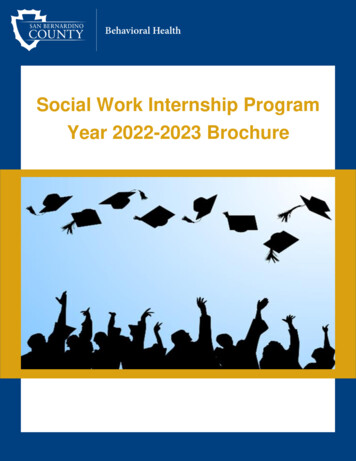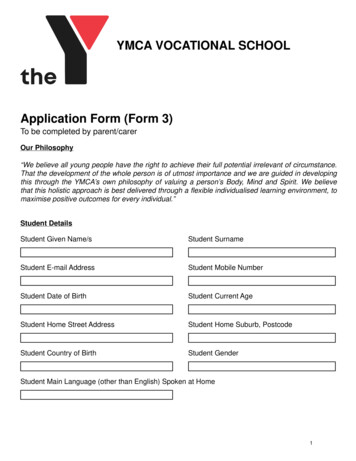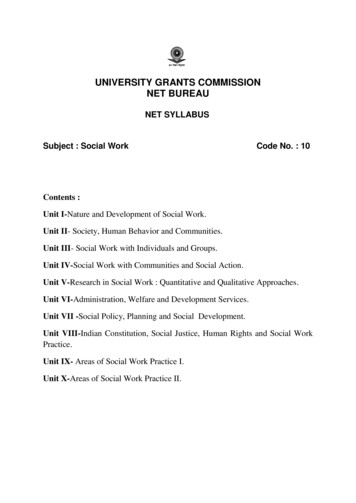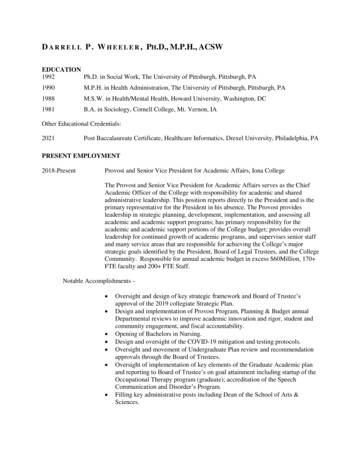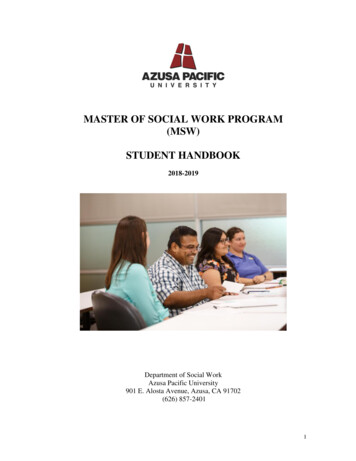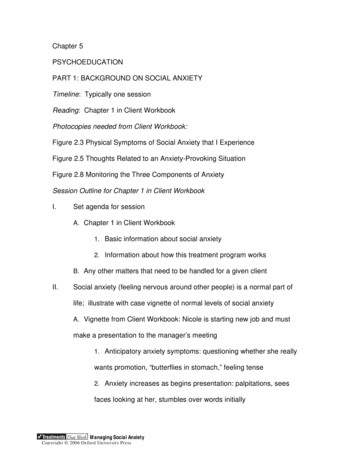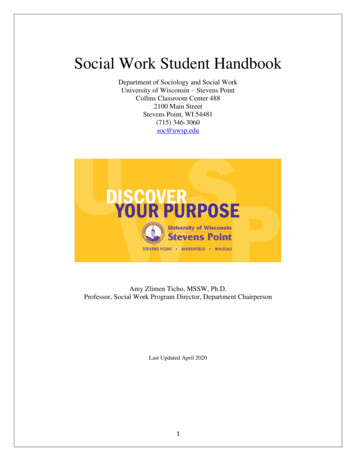
Transcription
Social Work Student HandbookDepartment of Sociology and Social WorkUniversity of Wisconsin – Stevens PointCollins Classroom Center 4882100 Main StreetStevens Point, WI 54481(715) 346-3060soc@uwsp.eduAmy Zlimen Ticho, MSSW, Ph.D.Professor, Social Work Program Director, Department ChairpersonLast Updated April 20201
Table of ContentsIntroduction/Welcome4History of Social Work at UW-Stevens Point4Accreditation4UWSP Mission and Purpose4Social Work Program Overview6Mission, Goals, and Objectives6Definition of Generalist Practice6Social Work Values and Ethics6Social Work Program Curriculum7Degree Requirements7Field Education8Special Work in Social Work and Social Administration8CSWE Core Competencies9Program Assessment10Admission into the Social Work Program11Declaring a Social Work Major11Advising11Admission Requirements11Admission Application12Admission Process12Procedures for Appeals of Denial of Admission12Academic Policies13Academic Standards for Performance13Academic Dishonesty and Disciplinary Procedures13Confidentiality14Sexual Harassment and Nondiscrimination142
Prior Learning (Experiential Credit)14Course Waivers and Substitutions14Grading Policy15Leave of Absence15Student Privacy15Standards for Professional Conduct15Performance Problems Outside of Field16Performance Problems in Field17Student Request for Termination18Faculty Field Coordinator or Supervisor Request for Termination18Student Rights and Responsibilities/Grievance Procedures19After Graduation20Social Work Certification20Employment21Graduate Study21Student Resources and Services21NASW21Student Awards, Recognitions, and Scholarships22Student Organizations and Service Opportunities23Opportunities to Engage in Research and Professional Development24Opportunities to Participate in Shaping the Social Work Program24International Opportunities for Social Work Students25Student Services at UW-Stevens Point25Concluding Remarks26Courses in Social Work27Faculty in Sociology and Social Work293
Introduction/WelcomeThe faculty and staff of the Department of Sociology and Social Work welcome you and wish youwell in your pursuit of a career in social work. Becoming a professional social worker can be apositive step toward a very rewarding career that can make a difference in the lives of individuals,families, groups, organizations, communities, and society as a whole. As a helping profession,social work involves working with people from diverse backgrounds in a variety of situations andacross a multitude of practice settings. With a focus on enhancing human well-being, socialworkers strive to meet the needs of all people and empower those who are vulnerable, oppressed,and/or living in poverty.The social work curriculum at UW-Stevens Point is designed to prepare students for entry-levelprofessional social work as well as graduate study in social work. Our program has a unique andimportant emphasis in preparing students to serve rural and tribal communities. We are pleasedthat you have chosen our program and look forward to assisting you as you progress through thesocial work major. This student handbook describes our social work major and provides guidanceto students related to admission, curriculum, policies and procedures, and resources and services.History of Social Work at UW-Stevens PointFor some time prior to 1992, the Department of Sociology offered a 12-credit emphasis in socialwork for sociology majors. Due to student interest in careers in social work, the Department ofSociology added a 31-credit minor Native American and Rural Social Work in 1992. With Councilon Social Work Education (CSWE) accredited programs becoming the standard and with theemergence of social work certification and licensure in 1994, it became clear the Department ofSociology needed to further develop and structure its social work program to best serve students.As such, the UW System was approached, and authorized approval for the implementation of asocial work major in 2008. The Department of Sociology formally began working with CSWE in2009 to work towards accreditation and became the Department of Sociology and Social Work inthe spring of 2010. The UWSP social work program earned its initial CSWE accreditation in thesummer of 2014.AccreditationThe Department of Sociology and Social Work at UW-Stevens Point earned accreditation of itssocial work program by the Council on Social Work Education (CSWE) in the summer of 2014.The program was reviewed by CSWE 4 years later and will be again every 8 years thereafter.UWSP Mission and PurposeUW-Stevens Point shares in the mission of the University of Wisconsin System:The mission of this system is to develop human resources, to discover and disseminateknowledge, to extend knowledge and its application beyond the boundaries of its campuses,and to serve and stimulate society by developing in students heightened intellectual,cultural, and humane sensitivities; scientific, professional, and technological expertise;and a sense of purpose. Inherent in this broad mission are methods of instruction, research,extended education, and public service designed to educate people and improve the humancondition. Basic to every purpose of the system is the search for truth.4
As an institution in the University Cluster of the University of Wisconsin System, UW-StevensPoint shares the following core mission with other universities of the cluster. Each university inthe cluster shall:Offer associate and baccalaureate degree level and selected graduate programs within thecontext of its approved mission statement. Offer an environment that emphasizes teachingexcellence and meets the educational and personal needs of students through effectiveteaching, academic advising, counseling, and through university-sponsored cultural,recreational, and extra-curricular programs. Offer a core of liberal studies that supportsuniversity degrees in the arts, letters, and sciences, as well as specializedprofessional/technical degrees at the associate and baccalaureate level. Offer a programof pre-professional curricular offerings consistent with the university’s mission. Expectscholarly activity, including research, scholarship, and creative endeavor, that supportsits programs at the associate and baccalaureate degree level, its selected graduateprograms, and its approved mission statement. Promote the integration of the extensionfunction, assist the University of Wisconsin-Extension in meeting its responsibility forstatewide coordination, and encourage faculty and staff participation in outreach activity.Participate in inter-institutional relationships in order to maximize educationalopportunity for the people of the state effectively and efficiently through the sharing ofresources. Serve the needs of women, minority, disadvantaged, disabled, andnontraditional students and seek racial and ethnic diversification of the student body andthe professional faculty and staff. Support activities designed to promote the economicdevelopment of the state.The select goals and responsibilities of UW-Stevens Point are to:Provide a broad foundation of liberal studies and selected degree programs in the fine arts,humanities, natural sciences, and social sciences, imparting the heritage of humancivilization, critical intelligence, and the skills necessary for a lifetime of learning andupon which education in the professional fields may be built. Provide undergraduateprofessional programs in communicative disorders, teacher education, home economics*,the visual and performing arts, paper science, and natural resources with emphases on themanagement of resources. Provide graduate programs in teacher education,communicative disorders, natural resources, home economics*, communication, and otherselect areas clearly associated with this university’s undergraduate emphases andstrengths. Provide programs in wellness and health promotion. Provide qualityundergraduate and graduate instruction through innovative methods using print and nonprint library resources, computing, communication technology, and direct studentassistance. Expect scholarly activity, including research, scholarship and creativeendeavor, that supports its programs at the associate and baccalaureate degree level, itsselected graduate programs, and its special mission. Cooperate with UW-Extension in thedevelopment and coordination of statewide outreach programming, integration of theextension function into the institution, and appropriate and adequate recognition of thoseinvolved in outreach activities.*The former home economics programs are now offered as child and family studies,dietetics, early childhood education, family and consumer education, humandevelopment, nutrition, and interior architecture.5
Social Work Program OverviewMission, Goals, and ObjectivesThe National Association of Social Workers (NASW) states in its 1999 Code of Ethics that theprimary mission of the social work profession is to enhance human well-being and help meet thebasic human needs of all people, with particular attention to the needs and empowerment of peoplewho are vulnerable, oppressed, and living in poverty. A historic and defining feature of social workis the profession's focus on individual well-being in a social context and the well-being of society.Fundamental to social work is attention to the environmental forces that create, contribute to, andaddress problems in living. Building upon this, the mission of the Social Work Program at UWStevens Point is to:Prepare students for entry level generalist social work practice, attending to the needs andresources of diverse populations and the understanding of global issues (such asoppression) that affect the human condition. The program prepares students to becompetent and professional community leaders who implement humane social policies,services, and programs that seek social and economic justice for individuals, families,groups, communities, and the broader global society. A unique emphasis of the programis a commitment to the well-being of those living in Rural Central Wisconsin communitiesas well as to the sovereign cultural identity of Native American communities within thisregion.Definition of Generalist PracticeUndergraduate students of social work are prepared to be generalist practitioners. According tothe Council on Social Work Education:“Generalist practice is grounded in the liberal arts and the person and environmentconstruct. To promote human and social well-being, generalist practitioners use a rangeof prevention and intervention methods in their practice with individuals, families, groups,organizations, and communities. The generalist practitioner identifies with the social workprofession and applies ethical principles and critical thinking in practice. Generalistpractitioners incorporate diversity in their practice and advocate for human rights andsocial and economic justice. They recognize, support, and build on the strengths andresiliency of all human beings. They engage in research-informed practice and areproactive in responding to the impact of context on professional practice.”Social Work Values and EthicsConsistent with the NASW Code of Ethics, the Social Work Program at UWSP supports the valuesof: Service, and recognizes social workers’ primary goal to help people in need and to addresssocial problems Social Justice, and the role of social workers in challenging social injustices The Dignity and Worth of the Person, and the need for social workers to treat each personwith care and respect, mindful of individual differences6
Importance of Human Relationships, and the understanding that relationships between andamong people are an important vehicle for change Integrity, and the need for social workers to behave in a trustworthy manner Competence, and the expectation that social workers will practice within their areas ofcompetence and develop and enhance their professional expertiseUpon admission into the social work program, students are expected to familiarize themselves withthe NASW Code of Ethics and to follow all ethical principles and standards described. The NASWCode of Ethics can be found at: Ethics/Code-of-Ethics-EnglishSocial Work Program CurriculumDegree RequirementsIn addition to completing the requirements listed below, students must fulfill the UWSP GeneralEducation Requirements and the UWSP requirement of 120 credits for graduation. Studentscompleting a Bachelor of Arts must additionally fulfill the foreign language requirement. Note:Course credit will not be granted for life experience or previous work experience.1. Supporting courses—22 credits—take all of the following: Political Science 101 (American Politics) Psychology 110 (Introduction to Psychology) Sociology 101 (Introduction to Sociology) Sociology 270 (Race and Ethnicity) OR Sociology 327 (Social Inequality) Sociology 350 (Sociological Theory) Sociology 351 (Social Statistics) OR Psychology 300 (Statistics for Psych.) Sociology/Social Work 352 (Research Methods)2. Core Social Work courses—30 credits—take all of the following: Social Work/Sociology 261 (Introduction to Social Work and the SocialServices Field) Social Work/Sociology 262 (Social Welfare Policies and Programs) Social Work/Sociology 263 (Ethical Practice in the Helping Professions) Social Work 316 (Child Welfare Practice) Social Work 359 (Social Work Methods: Casework) Social Work 361 (Social Work with Groups) Social Work 362 (Social Work Methods: Community Organization andSocial Service Administration) Social Work 365 (Social Work Practice with Diverse Populations) Social Work/Sociology 376 (Human Behavior and the Social Environment) Social Work 385 (Social Work and Mental Health)7
3. Electives—3 credits—take one of the following: Social Work 381 (Death, Dying, Loss and Grief) Social Work 383 (Substance Use Disorders: Assessment and Intervention) Social Work 387 (Emerging Issues in Social Work with Children and Youth)4. Capstone Experience—9 credits—take all of the following: Social Work 494 (Social Work Practicum) Social Work 495 (Social Work Practicum Seminar)Students who major in social work do not have to select a minor in order to graduate. There are,however, several other majors and minors offered at UW-Stevens Point that would complementthis major well including sociology, psychology, gerontology, child and family studies, humandevelopment, public policy and administration, religious studies, women’s studies, and family lifeeducation.Field Education (SW 494/495)Field Education (sometimes called practicum or internship) is considered the “signature pedagogy”or “capstone” in the social work curriculum. This means that it is the central form of instructionand learning in which the profession socializes its students to perform the role of practitioner. Theintent of field education is to connect the theoretical and conceptual contribution of the classroomwith the practical world of the practice setting. All social work students must complete at least 400hours of internship in an approved agency and meet in a weekly seminar each semester that theyare interning. This experience typically takes place during the student’s senior year and requires aformal application process. The Department of Sociology and Social Work has establishedrelationships with numerous community agencies spanning a six-county area and involving manydifferent client populations. Students are encouraged to review the Field Education Manualavailable on the Department website for further details.Special Work in Social Work and Social Administration (SW 498)Upper class majors in social work may arrange for special work/independent study. Credits willbe based on the scope of the project. This is a way to work independently at applying conceptsand skills learned in previous courses to an independent study of a particular project or to study atopic which is not available as a regular course in the Department.How to Apply:1. Develop a brief written statement of your topic and plan for the work you propose.2. Look at the faculty specializations in this handbook to learn which professor might beinterested in supervising your work. Contact the professor and ask whether she/he has thepreparation, time, and interest in being your supervising professor.3. Get a copy of the Special Work/Independent Study Registration Form and SpecialWork/Independent Study Information Sheet from the Department Office.4. Make an appointment with the faculty member you will ask to supervise your study. Meetand develop a mutually acceptable plan. Together you will negotiate and write a SpecialWork Course Description Agreement.8
5. Have all forms signed by the faculty member and yourself and submit the completed formsto the Department Office for approval by the Department Chair.CSWE Core CompetenciesGraduates of the social work major are expected to demonstrate the integration and application ofthe nine core competences identified by CSWE, as evidenced by the associated student outcomesfor each competency. Throughout courses, and upon successful completion of field education,students should be able to demonstrate all of the expected knowledge, skills, and values-basedlearning outcomes identified in this section.1. Demonstrate Ethical and Professional Behaviora. Make ethical decisions by applying the standards of the NASW Code of Ethics,relevant laws and regulations, models for ethical decision-making, ethical conduct ofresearch, and additional codes of ethics as appropriate to context.b. Use reflection and self-regulation to manage personal values and maintainprofessionalism in practice situations.c. Demonstrate professional demeanor in behavior, appearance, and oral, written, andelectronic communication.d. Use technology ethically and appropriately to facilitate practice outcomes.e. Use supervision and consultation to guide professional judgment and behavior.2. Engage in Diversity and Difference in Practicea. Apply and communicate understanding of the importance of diversity and differencein shaping life experiences in practice at the micro, mezzo, and macro levels.b. Present themselves as learners and engage clients and constituencies as experts of theirown experiences.c. Apply self-awareness and self-regulation to manage the influence of personal biasesand values in working with diverse clients and constituencies.3. Advance Human Rights and Social, Economic, and Environmental Justicea. Apply understanding of social, economic, and environmental justice to advocate forhuman rights at the individual and system levelsb. Engage in practices that advance social, economic, and environmental justice.4. Engage in Research-Informed Practice and Practice-Informed Researcha. Use practice experience and theory to inform scientific inquiry and research.b. Apply critical thinking to engage in analysis of quantitative and qualitative researchmethods and research findings.c. Use and translate research findings to inform and improve practice, policy, and servicedelivery.5. Engage in Policy Practicea. Identify social policy at the local, state, and federal level that impacts well-being,service delivery and access to social services.b. Assess how social welfare and economic policies impact the delivery of and access tosocial services.c. Apply critical thinking to analyze, formulate, and advocate for policies that advancehuman rights and social, economic, and environmental justice.9
6. Engage with Individuals, Families, Groups, Organizations, and Communitiesa. Apply knowledge of human behavior and the social environment, person-inenvironment, and other multidisciplinary theoretical frameworks to engage with clientsand constituencies.b. Use empathy, reflection, and interpersonal skills to effectively engage diverse clientsand constituencies.7. Assess Individuals, Families, Groups, Organizations, and Communitiesa. Collect and organize data and apply critical thinking to interpret information fromclients and constituencies.b. Apply knowledge of human behavior and the social environment, person-inenvironment, and other multidisciplinary theoretical frameworks in the analysis ofassessment data from clients and constituencies.c. Develop mutually agreed-on intervention goals and objectives based on the criticalassessment of strengths, needs, and challenges within clients and constituencies.d. Select appropriate intervention strategies based on the assessment, research knowledge,and values and preferences of clients and constituencies.8. Intervene with Individuals, Families, Groups, Organizations and Communitiesa. Critically choose and implement interventions to achieve goals and enhance capacitiesof clients and constituencies.b. Apply knowledge of human behavior and the social environment, person-inenvironment, and other multidisciplinary theoretical frameworks in interventions withclients and constituencies.c. Use inter-professional collaboration as appropriate to achieve beneficial practiceoutcomes.d. Negotiate, mediate, and advocate with and on behalf of diverse clients andconstituencies.e. Facilitate effective transitions and endings that advance mutually agreed-on goals.9. Evaluate Practice with Individuals, Families, Groups, Organizations, andCommunitiesa. Select and use appropriate methods for evaluation of outcomes.b. Apply knowledge of human behavior and the social environment, person-inenvironment, and other multidisciplinary theoretical frameworks in the evaluation ofoutcomes.c. Critically analyze, monitor, and evaluate intervention and program processes andoutcomes.d. Apply evaluation findings to improve practice effectiveness at the micro, mezzo, andmacro levels.Program AssessmentAs a professional degree program accredited by the Council on Social Work Education (CSWE)and consistent with the assessment policies of UW-Stevens Point, the Social Work Programundertakes a detailed, ongoing assessment of student achievement and learning outcomes. Thisprocess includes evaluations of student performance in field, surveys upon entrance and exit to theSocial Work Program, and an exit exam. Further, assessment of the supervisors and sites associatedwith the Field Education Program is conducted on an ongoing basis.10
Admission into the Social Work ProgramDeclaring a Social Work MajorStudents who wish to major in social work but have not yet been officially accepted into the majorwill be titled intended majors. To declare an intended major in social work, students should visitthe Department of Sociology and Social Work office to complete the form necessary to do this.Once a student is officially accepted into the social work major, his or her status will be changedto social work major by the Department of Sociology and Social Work Academic ProgramAssociate.AdvisingStudents declaring an intended major in social work will be assigned a faculty advisor within theDepartment of Sociology and Social Work. All department faculty members are prepared to adviseboth sociology and social work students. Students admitted into the social work major will beassigned one of the full-time social work faculty members as advisors.Admission RequirementsThe Social Work Program Committee is pleased to accept applications from interested andqualified students for the social work major. Seats in the major are limited to ensure an acceptablefaculty-to-student ratio, with a commitment to providing quality classroom, advising, andinternship experiences. The Social Work Program Committee reserves the right to admit a limitednumber of students each semester. Meeting the minimum standards does not guarantee that astudent will be admitted into the major. Only students who meet the admission guidelines andshow strong potential to succeed in social work practice by demonstrating interest, commitment,interpersonal skills, relevant experiences and academic ability will be considered for the program.This formal application for admission is the first step in meeting the requirements for graduationwith a social work major. A second application process and additional eligibility requirements arenecessary for admission into the internship program.Students seeking admission must: Have completed at least 45 credits of undergraduate coursework at the time of application(application for admission typically takes place at the end of the sophomore year). Have earned a minimum grade point average of 2.5 from all accredited institutions attended. Have earned a minimum grade point average of 2.5 in the required pre-admissioncoursework (Sociology 101 and Social Work/Sociology 261). Have earned a minimum grade of C- in Social Work 261 (Introduction to Social Work) Be in good academic standing in the semester in which they apply. Conviction of past criminal activity or conduct will not be used as a criterion for denial ofadmission into the social work major. However, past or future criminal activity or conductmay limit or inhibit the student from securing a social work internship which is requiredfor completion of the social work degree. In addition, the student may be ineligible to11
receive state certification or licensure to practice social work. For advising purposes, thestudent should discuss any questions with a social work faculty member.Admission ApplicationA complete application (submitted online through the Department website) contains: A social work admissions application A copy of a current UW-Stevens Point Degree Progress Report. Two letters of recommendation (letters should be from professors or advisors outside ofthe Department of Sociology and Social Work, work or volunteer supervisors, and/ormentors who know you well). A personal narrative statement expressing your interests, motivations, experiences, andgoals related to the social work profession.Admission ProcessThe admission process takes place two times per year, once during each regular semester.1. Students submit application materials through the Department of Sociology and SocialWork website by October 10 or March 1.2. Applications are reviewed and decisions made by the Social Work Program Committee.The Committee is comprised of the full-time social work faculty and one additional facultymember within the Department. Personal interviews are used to select candidates whennecessary.3. Applicants earning admission and those denied admission are notified by November 1 (forfall semester) or April 1 (for spring semester) by the Social Work Program Coordinator.Applicants will be notified by mail.4. Documentation of students’ applications will be maintained in the Department ofSociology and Social Work.5. Students not earning admission may reapply during the next admission cycle. Such studentsmay request a meeting with any member of the Social Work Program Committee to discussreasons for denial and suggestions for strengthening their application.6. Students not earning admission may appeal the decision using the process described below.7. Any student who withdraws from the social work major or who does not take classes atUW-Stevens Point for two or more consecutive semesters must reapply for admission intothe major.Procedure for Appeals of Denial of Admission1. The student must respond in writing within 10 working days of receipt of his or her letterinforming of denial of admission to the social work major. The letter should be addressedto the department chairperson, with a copy sent to the student’s advisor.12
2. The appeal must indicate specific reasons as to why the Social Work Program Committeeshould reconsider the application.3. An Appeals Board comprised of three Department members, not to include the student’sadvisor, will be formed by the department chairperson to review all appeals.4. If the student has evidence that the Appeals Board has made its decision in violation of theprogram’s policies, the student may appeal the Board’s decision in the following sequence:1) to the Department Chair, and 2) to the Dean of the College of Letters and Science.Academic PoliciesAcademic Standards for PerformanceThe Social Work Program follows the grading policy and interpretation of grades of UW-StevensPoint as found in its current undergraduate catalog. The program reserves the right to recommenddismissing students who fail to meet minimum standards for academic performance from theprogram and/or to deny or delay permission to proceed into internship until satisfactoryperformance is achieved. Classroom performance is assessed on the basis of assignments asoutlined in each course syllabus. Attendance criteria and timely delivery of papers are factored inas outlined in the instructor’s syllabus. Additional program standards for academic performanceare as follows: Maintain 2.5 GPA in social work major and supporting coursework. Maintain 2.5 cumulative GPA in all UW-Stevens Point and transfer credits attempted. Maintain a “C-” or better in each required social work course. Comply with the standards for professional conduct and the NASW Code of Ethics asoutlined in this manual.Students failing to meet either the University or Social Work Program’s standards for academicperformance and/or who are on academic probation are expected to notify their social work facultyadvisor immediately. Students violating any of the above retention standards will be allowed atwo-semester probationary period in which they can attempt to bring themselves into compliancewith the standards while remaining in the major. If, following their probationary period, they arestill not in compliance with the retention standards, they will be dropped from the Social WorkMajor.Academic Dishonesty and Disciplinary ProceduresAs stated in the UW-Stevens Point Community Rights and Responsibilities Handbook, “The boardof regents, administrators, faculty, academic staff and students of the University of Wisconsinsystem believe that academi
Due to student interest in careers in social work, the Department of Sociology added a 31-credit minor Native American and Rural Social Work in 1992. With Council on Social Work Education (CSWE) accredited programs becoming the standard and with the . (Sociology 101 and Social Work/Sociology 261). Have earned a minimum grade of C- in .
